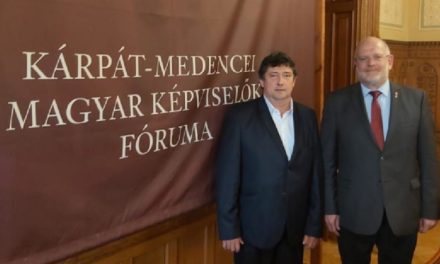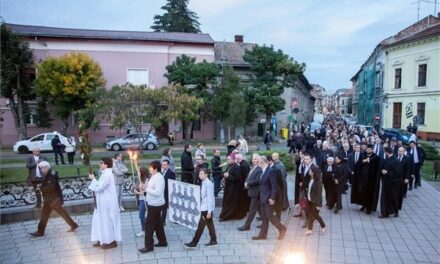An interesting exchange of letters resulted from the petition that the participants of the Székely Freedom Day accepted with a public outcry on March 10 of this year at the Marosvásárhely memorial of the Székely martyrs.
For the first time, a response signed by a member of the Romanian government was received to the petition handed over to the prefect of Maros county. As the conclusion of a three-page letter, Adrian Veștea, the minister responsible for development, public administration and public works, actually stated that
the Romanian government does not negotiate "what does not exist" with "those who do not exist".
The letter and Balázs Izsák's response to it were made public by the press service of the Székely National Council (SZNT) on Tuesday.
Adrian Veștea stated at the end of his letter:
"The Romanian government cannot start negotiations about something that does not exist (the legal status of Székelyföld) with an entity that is not subject to international law (the Székelyföld National Council) about a legislative initiative (the Autonomy Statute of Székelyföld) that was rejected by the parliament and whose provisions violate the Constitution of Romania ".
In light of all this, he classified it as having no legal basis and rejected the SZNT's demand for autonomy. However, before reaching this conclusion, he described that the SZNT, based on a legislative initiative, requests that
"Székelyföld should form an independent administrative and development region with autonomous powers",
which was discussed and rejected by the Romanian Parliament at the end of 2023.
The minister argued that the creation of an autonomous region is a matter of state administration and not a matter of local interest. He added: Romania's constitution only recognizes municipalities, cities and counties as administrative units, regions and macro-regions only have a statistical role. According to Adrian Veștea, Article 11 of the Council of Europe's recommendation 1993/1201 - which the SZNT referred to in its March petition - does not impose any obligations on a member state of the Council of Europe.
"The interpretation according to which, according to the annex to the 1993/1201 recommendation, Romania would have a definite obligation to ensure ethnic-based territorial autonomy, is abusive and legally unsustainable. There is no international agreement that contains such or a similar provision, and to which Romania is a party"
- announced the head of the ministry.
According to the minister who politicizes in the National Liberal Party (PNL), the 1993/1201 recommendation tried to settle the issue of minority protection by extending the European Convention on Human Rights towards minorities. However, the Council of Europe ultimately chose another path and created the Framework Convention for the Protection of Minorities, to which Romania is a party. The liberal minister from Brasov finally cast doubt on the Székely National Council's ability to negotiate.
the petition "start a dialogue" (să înceapă tratative), he talked about which entities according to international law can be the legal subjects of a negotiation that ends with the signing of an agreement (treaty). According to his findings, the Székely National Council does not belong to these. In his answer, Izsák Balázs stated that a passage - which the minister considered unconstitutional - comes from the Charter of Regional Autonomy, which was developed by the Council of Europe, but has not yet been adopted, so he can only refer to the document as a draft.
The president of the SZNT believed that the provision of the constitution, according to which the territory of Romania is administratively organized into villages, cities and counties, will soon become obsolete. In support of this finding, he referred to the drafts of the Romanian public administration reform and the recommendation 1811/2007 of the Council of Europe. The latter is about the regionalization of Europe.
Balázs Izsák described as a clear serious mistake the finding that the recommendation 1201/1993 of the Council of Europe does not impose obligations on the member states, including Romania. Article 11 of the document states:
"In those areas where persons belonging to national minorities constitute the majority, these persons have the right to have a local or autonomous public administration appropriate to their specific historical and territorial situation and in accordance with the internal laws of the state, as well as a special status."
Izsák Balázs reminded that Romania unilaterally and freely undertook to fulfill the provisions of Recommendation 1201/1993 upon joining the Council of Europe. This commitment was made by the ET Parliamentary Assembly in the 176/1993. accepted in opinion no. He cited that the General Assembly "appreciates the written declaration of the Romanian authorities, in which they undertake to implement their policy in the field of the protection of national minorities in accordance with 1201/1993 are based on the principles defined in recommendation no .
He also reminded that the decision of ET 1123/1997 also clearly requires Romania to "continue to base its minority policy on the principles formulated in recommendation 1201/1993". He believed that the recommendation also became legally binding for Romania when it was included in the Romanian-Hungarian basic agreement in 1996.
"You have no right to deny the obligations undertaken by the Romanian state!"
- declared the president of the SZNT, who considered it his civic duty to inform the Council of Europe about the Romanian government's "new turn" in this matter. He reminded that, following a similar statement by former Romanian President Ion Iliescu, Romanian diplomacy was later forced to admit the mistake. Responding to the minister's suggestion that the Székely National Council cannot be subject to international law, Izsák Balázs mentioned the Minority Treaty concluded in Paris in December 1919, in which Romania undertook to
"under the control of the Romanian state, it provides autonomy in religious and school matters to the Székely and Saxon communities in Transylvania".
He believed that from then on, the Székely community could be considered a subject of international law, able to conduct negotiations and conclude contracts with the Romanian state.
"But even if we put this particularly important event in parentheses, we can still ask the question: in a democratic country, it would not be natural for state authorities to negotiate with different groups of their citizens, be they national, religious, professional, etc. communities? Wouldn't it be natural if, in a democratic country, the future of a region is decided by the residents of that region? Why is Romania the country where obvious and natural things must be protected every day?"
asked the head of the organization. Izsák Balázs also confronted the minister with the thesis of the non-existent Székelyföld.
"Even if Székelyföld is not an administrative unit of Romania, wouldn't it be correct to treat it equally with Mócsvidék, Avasvidék and Hátszeg?"
he asked the question. A similar exchange of letters last took place ten years ago between the SZNT and an official of the Romanian government. At that time, the directorate responsible for public relations and communication of the Prime Minister's Office of the government led by Victor Ponta responded in a similar spirit to the SZNT petition.
Featured image: Facebook/Székely flag around the world













